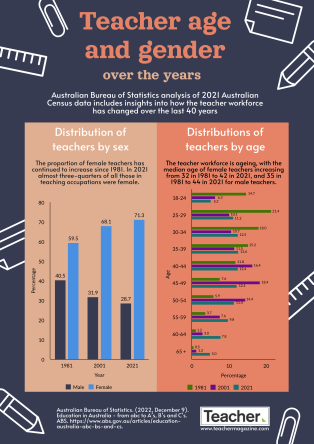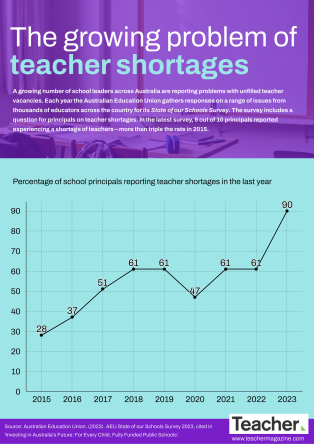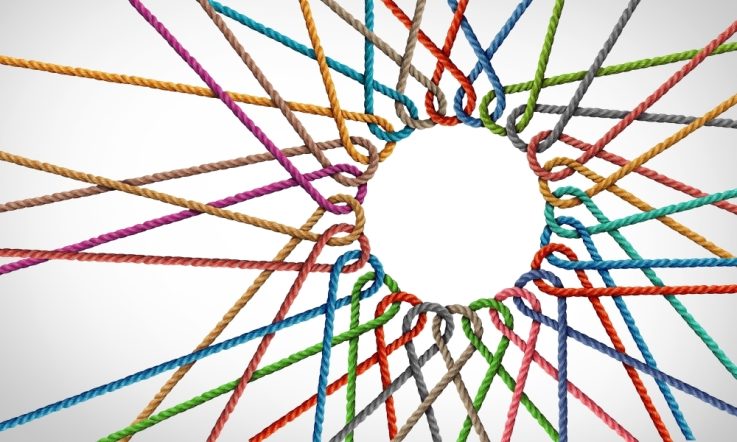Before we get into this episode, are you subscribed yet to the free weekly Teacher bulletin? Get a weekly wrap of our latest content straight to your inbox. Join our community by clicking on the sign-up button at our website, teachermagazine.com.
Thanks for downloading this podcast from Teacher. I’m Dominique Russell.
As an educator, you may unfortunately be aware that misogynistic thinking and toxic masculinity has increased among young boys and men over the last few years, in part thanks to the power of social media influencers or ‘manfluencers’ such as Andrew Tate. If you work in a school with male students, you may have been confronted by misogynistic or sexist comments at work or know of a colleague who has. So, what can classroom teachers do to tackle misogyny in their classrooms, and what can leaders do to create safer spaces? These are the questions a new 2-year research project led by academics at Monash University hope to answer.
In this episode of The Research Files, I’m joined by Lead Researcher Dr Naomi Pfitzner, Deputy Director of the Monash Gender and Family Violence Prevention Centre and Co-Chief Investigator Dr Stephanie Wescott, from the Faculty of Education at Monash University. Naomi and Stephanie are going to tell us about what they hope this 2-year research project will produce in the way of practical resources for teachers; the reality of what female teachers are facing in Australian schools at the moment; and the impact this misogyny and toxic masculinity can have not just on women teachers, but on female students, as well. Let’s get started.
Dominique Russell: Naomi and Stephanie, thanks for joining us on this podcast episode. To get started, I thought it would be great if you could both introduce yourselves to our listeners and also tell us a little bit about your research areas of interest.
Stephanie Wescott: Thank you for having both of us. My name is Stephanie Wescott. I’m a lecturer in Humanities and Social Sciences in the School of Education, Culture and Society at the Faculty of Education, Monash University. I'm a former teacher. So that's a little bit of context to some of the work that we're doing in this study that we're talking about today. But my current area of research is looking at the influence of manosphere inspired misogyny on boys in Australian schools and also the effects of that on, of course, women and girls who are part of schools as well. My other area of research is on evidence-based discourses in education, and both of these projects are connected through my orientation as a feminist researcher.
Naomi Pfitzner: I'm Naomi Pfitzner. I'm the Deputy Director of Monash Gender and Family Violence Prevention Centre and a Senior Lecturer in Criminology at Monash University. Somewhat oddly, though, I'm not [a] traditional criminologist, my background’s actually in sociology and law, but my research really focuses on the prevention of gender-based violence, and through that, has a real key focus on respectful relationships education, but also kind of gender transformative education more broadly. And how we can use transformative educational initiatives to achieve social change.
DR: And so we're talking today about a new project that you 2 are going to be involved in over the next 2 years that's looking at tackling misogyny in schools. I'm interested then from both of your perspectives, why this specific area was a really important area for you to research.
NP: Sure. So, I've been leading a number of projects at kind of a national and state level, looking at the implementation of respectful relationship education and also what is best practice, evidence-based, high-quality delivery of respectful relationship education if our end goal is preventing gender-based violence and achieving social change. And I think something that came up in all of my work from teachers and other school staff was, firstly, how much they really want to do work in this space, but they need professional learning. They want to know how to do it well, they want to have the knowledge, confidence and skills to call out sexist and misogynistic attitudes/behaviours when they see it in their school community, in their classrooms, but that they need some support about how to do that. So that was really where my interest came out.
And I think also I was aware of some of the research that Steph and our other colleagues have been doing and a lot of the stakeholders that I work with have been talking about kind of this rise in misogynistic behaviours coming out and how it's not always so thoroughly addressed through some of the existing consent and respectful relationship programs and what we could do to kind of address this increasing traction of manosphere content that we're seeing play out in schools across Australia and internationally.
DR: And so Stephanie we’ll get to that project that the prior research that Naomi just mentioned there later on in the episode. But why was it important for you to be involved in this project from your perspective?
SW: It was important to me as a feminist researcher, first and foremost, who’s interested and concerned about how gender-based violence manifests in schools and its effects on girls and women. But even prior to that, as a feminist-identifying teacher, this is something that I observed in the schools that I worked in. And it was just interesting to me that this was just sort of an accepted part of the work of teaching – that you would encounter sexism, sexual harassment, and misogyny within the cultures of schools. And that this was just sort of a normative, daily experience of women.
We have research too that supports that – research dating back decades on these sorts of problems in education. But as we've discussed in this research project and in our papers, there's a new turn in this kind of behaviour presenting in schools because of extremist ideologies online. So it's important to me because I care about girls and women and of course, boys too, and their relationships with girls and women. I think that the broader problem of gender-based violence that Naomi’s work looks at, I think there's a lot that we can do in schools that we're not currently doing, or not currently doing to the extent that we could be.
DR: And so there are going to be 3 phases to this upcoming research project. Naomi, can you share with us what those 3 phases are going to involve exactly?
NP: Sure. So this kind of first phase is really a development phase. So as part of that, we're going to be doing an evidence review, which will be looking at, how do young people interact with these kind of misogynistic and sexist narratives and discourses that are kind of espoused in a manosphere? But more importantly, how is it shaping their attitudes and behaviour? And how is it shaping their interactions? Not just with other young people, but with, you know, other adults in their lives. And then it's really looking at the development of the program. So we are going to be holding focus groups with young people to get a more authentic understanding of how they negotiate this content and whether, you know, how does that influence their behaviour or whether they challenge it themselves or within their friendship circles?
And then we're going to hold co-design workshops with school staff and stakeholders across school sectors as well to really make sure that the professional learning program that we're developing is tailored to their needs, provides them with the tools and support that they need to have these conversations that are often quite challenging and can be uncomfortable and require deep reflection.
And so the other 2 phases is then, from next year, we'll be rolling out the pilot professional learning program and then we'll be doing an evaluation. And really, that's tailored to be kind of an iterative pilot and evaluation to make sure as we go, we can see what's working, what's not working so well, how can we tweak it? And learning about what works best when it comes to this professional learning when we're looking at this kind of subject matter.
DR: After the break, Dr Stephanie Wescott will share more about the research that’s already been done in schools in this area.
If you’re enjoying the Teacher podcast channel, have you subscribed yet to the free Teacher bulletin? It’s the best way to get our latest stories straight to your inbox. In addition to a weekly wrap up of our latest content, subscribers to the bulletin can receive Teacher Trending, where we share our top 5 pieces of content on a trending topic, and special editions where we share a bonus piece of content with you. The sign-up process is easy – just visit our website, teachermagazine.com and click on the sign-up button on the righthand side of our homepage.
DR: And so as we've alluded to, there's some research that's already been done in schools in this area. Stephanie, you were recently the lead author on a paper titled The Problem of anti-feminist ‘manfluencer’ Andrew Tate in Australian schools: women teachers’ experiences of resurgent male supremacy. Can you tell us a little bit about what this research project involved?
SW: Sure, so I guess, the beginning of the project was our interest in what we were seeing that was coming out of the UK. There was lots of news reports in early 2023 indicating that women were concerned about changes in boys’ behaviour and attitudes. And Steve [Roberts], my co-author and I were curious about whether that was something that was also occurring here in Australia. But we just couldn't find anything on it. No one was talking about it, no one was publishing on it. And that's not unusual when something is sort of occurring in schools, because it's quite difficult for teachers to speak to the media, or to speak out. Often their employment contracts prevent them from doing so.
So that's where research can step in, to give teachers a space to speak anonymously with their identities protected about concerning social issues within schools. So we put a call out on social media to speak to women teachers about whether they were seeing the influence, specifically of Andrew Tate – because he was sort of the biggest and most recognisable manosphere figure at the time – whether they'd seen manifestations of his content and ideology in schools. And we were surprised at the level of engagement and interest we received from that call out. And we continue, a year later, to receive emails from women wanting to disclose stories, and from parents too, wanting support and resources to support their children.
So what we found from this study was that Andrew Tate’s ideologies had influenced classrooms; that boys’ behaviour and attitudes had changed towards women and girls; women reported an uptick in general sexism, targeted sexual harassment, and I guess sort of male supremacy type behaviour. And this was affecting the women, obviously, because schools are workplace and women and girls have a right to feel safe in their workplaces. And 2 of the 30 women that we spoke to formally for that paper left their jobs because of this. So we knew quite quickly that we had identified something that was pretty concerning, because the women's stories were so strikingly similar regardless of where they were located. And so we wanted to publish quite quickly and to speak to the media to get some action happening on this problem.
DR: And so in terms of those interviews that you conducted as part of that research, are you able to share any specific examples of what these experiences of these teachers were to give us a bit of an idea of the reality that they're facing?
SW: Sure. So there’s sort of different categories of behaviour. So, if we talk about sexual harassment, for example, that might be boys commenting on their teacher’s body or on what their wearing. So, a pretty common thing is ‘your boobs look good’ or … you know at an end of year event or something, there was an example of a boy saying, ‘Miss, you've looked really good all year’. So, comments on physical appearance are quite common, either directed towards the teacher, or directed to girls in the room, or commenting generally on women's bodies if they come up in discussion in the content in the classroom.
Another aspect of that also is blatant misogyny. So things like – a question that always comes to my mind from the data is a boy said to his teacher: ‘Miss, do you think that women should be allowed to drive, because Andrew Tate says that they get into more accidents than men do?’ The downplaying of women's experiences – so, another example in an English class is a boy saying when they're reading a text written by a woman (a non-fiction text): ‘Miss, why do we have to read these myths?’ So denigration of women's experiences and personhood and value as human beings is really common.
And then the other element to this is just sort of this regressive masculinist dominance. So physical domination of women in classroom spaces and of girls in classroom spaces. Some women feel unsafe going out on yard duty because of physical expressions of aggression from boys. And then of course, just Andrew Tate’s, you know, sayings, ideas, his name being brought up quite frequently as a provocation that women feel that they then have to sort of enter into, sort of, as a critical discussion; but it's just so difficult to do that because often the boys have made up their mind and it's not actually a line of inquiry that they're initiating with the teacher.
And then there's just some really heartbreaking stories that we've collected too, of the impact on girls. So, girls sort of becoming quite silent in classrooms, afraid to speak or contribute because of fear of retribution, or sort of approaching their teachers and apologising for boys’ behaviour and disclosing things like, ‘you know, Miss, the things they say to us I can't even repeat them.’ So that's the general gist of the data. A lot of it is just disturbing and just would not be accepted, I think, in any other workplace, or at least would have a response or consequence at the very least; but many of the women that we spoke to have felt really let down by their school.
So there's an additional layer to this issue, which is the systems and structure that schools lack when it comes to responding to these things and taking them seriously. Often women feel gaslit or that their experiences are diminished when they report them. They may not be believed, or it's just sort of accepted as part of the culture of being a woman in a school, that boys are going to try out this stuff and that girls and women are sort of collateral in that experience of being a teenage boy.
So they were sort of the key concerning themes and just the incredible pressure that women feel to model responses to this when it's happening to them, because they're very aware that girls are watching. And that's an additional layer of responsibility. But it was clear from the data that we needed to respond to this in multiple ways through curriculum – which is where this research project comes into things – but also, through leadership and how schools are run and accepted models and ways of behaving in schools.
DR: And so back to this upcoming project now. Naomi, what do you anticipate the outcome of this research will be, or, in other words, what supports do you think schools need in this area, to follow on from what Stephanie's just told us?
NP: Sure. I think, you know, some of the stories that Stephanie was just telling you about and the other ones that she's captured in her research talk about, you know, the awareness that these women teachers have, that they are role modelling, but the uncertainty about the best way to respond. And I guess that's part of the reason that we wanted this research to have a real kind of practical solutions focus and develop a professional learning program. Because these are really tricky, challenging conversations and we can't expect teachers to have an inherent understanding of what's the best way to do this. And we want to really kind of provide them with that support, the knowledge, kind of practical skills about how to have these conversations.
And I guess one of the key aims of the professional learning is to develop critical reflection in young people. It's so important for them to kind of actually reflect on and understand and develop an awareness, too, because some of these young boys and some of the stories we hear where they're mimicking some of, you know, Andrew Tate's catchphrases or sayings that they [see] online, they may not have even reflected on what's the actual meaning and impact on them and why it is problematic and why it is harmful. So it's not just sufficient to kind of reprimand students when we see this behaviour. If we actually want to achieve attitude and behaviour change, we have to engage them in critical reflection. We have to get them to do that deep thinking and think about – maybe it is going to be challenging some of their deeply held biases and values. And that's going to take time, but hopefully, you know, the aim with this research is that we're equipping teachers with the skills to be able to support that ongoing work in building critical reflection. And it's not just important in this space when we're thinking about gender-based violence prevention, but there is so much mistruth and misinformation in the world that critical reflection is becoming such an important life skill.
… So, we do have a dedicated project page – it’s on the Monash Gender and Family Violence Prevention website where we will keep everyone updated, we'll communicate with people who are interested to learn more and also advertise opportunities to contribute to this research, if you're interested. We also have a dedicated project email, so it's supportingschools@monash.edu and if anyone wants to learn more, has questions, wants to be involved, they can please reach out. Our team monitors that all the time and we will get back to you.
That’s all for this episode. Thanks for listening. Don’t forget to follow our podcast channel wherever you get your podcasts from, so you can be notified of any new episodes as soon as they land. It also helps more people like you to find our podcast and it’s a really big help for our team.
Before you go, are you currently subscribed to the weekly Teacher bulletin? It’s a free weekly wrap of our latest content straight to your inbox. Join the more than 40,000 educators who are already part of the community by clicking on the sign-up button at our website, teachermagazine.com.
References and related reading
Wescott, S., Roberts, S., & Zhao, X. (2023). The problem of anti-feminist ‘manfluencer’ Andrew Tate in Australian schools: women teachers’ experiences of resurgent male supremacy. Gender and Education, 36(2), 167–182. https://doi.org/10.1080/09540253.2023.2292622
The dedicated project website for the new research project is available here.
Dr Stephanie Wescott says research has shown ‘…boys’ behaviour and attitudes had changed towards women and girls; women reported an uptick in general sexism, targeted sexual harassment, and … male supremacy type behaviour’. Is this something you’ve experienced in your school? Do you know who to ask for help?
Dr Naomi Pfitzner says ‘…there is so much mistruth and misinformation in the world that critical reflection is becoming such an important life skill’. How are you supporting students to develop these skills and undertake critical reflection, particularly in relation to information they see online?



